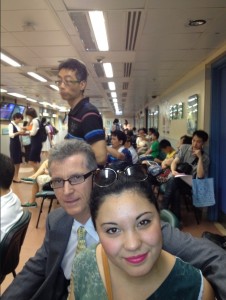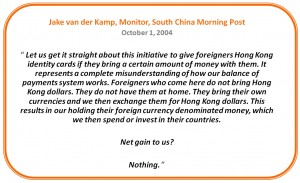14
Jul 2012Hong Kong Investment Visa – Case Which Would Not Get Approved Today But Will Be Approved 9 ~ 12 Months From Now
Posted by The Visa Geeza / in Investment Visas, Refusals & Appeals, Your Question Answered / 10 responses

This question is a really interesting one as, from an immigration perspective, it suffers from the lack of a compelling reason for the owner of the business to be able to show the Hong Kong Immigration Department that she is in a position to make a substantial contribution to the economy of Hong Kong – today. Next year, however, she may be much better placed…
QUESTION
“I am looking to establish my business in Hong Kong so I would need to get a Business Investment Visa, and I am wondering if you could take a quick look at my situation.
My current situation is this:
• I am a 25 year old woman of Swedish nationality.
• I have a current business (sole proprietorship) in Sweden.
• My business is in Internet Marketing, my main specialisation is in driving traffic (visitors) to e-commerce websites.
• My main partners are Ebay.com and Amazon.com.
• I have been focusing mainly on the American market.
• This business is fully Internet based, which means.
• Me and my employees only need a computer with Internet for work.
• I can relocate my whole business without any problems.
• Currently I have 3 “employees”, all are from the India.
• On average I pay them 8.000 HKD / month for full time work.
• I don’t have any official contracts stating they are my employees, I think they would fall under the category freelancers.
• I started this business officially in 2010.
• In 2010 I made a profit of 22.000 Euro (~210.000 HKD) – 40.000 Euro revenue, 18.000 Euro expenses.
• In 2011 I made a profit of 25.000 Euro (~240.000 HKD) – 51.000 Euro revenue, 26.000 Euro expenses.
• In the first half of 2012 I made around 42.000 Euro revenue (~400.000 HKD). I think the profit over this period should be between 25% and 50% of that.
• I currently have about 42.500 Euro in my bank account.
• I am currently developing a new system.
• I have analysed all of my previous strategies and efforts and designed this system based on that.
• It should be ready before the shopping season at the end of the year, in fact it’s almost in a stage where we can start testing it.
• When the system is finished it should result in a huge boost in revenue and a reliable stream of income.
I don’t have any degrees or certificates for proof of my expertise. I finished school at the age of 18 or 19 and after that I tried studying at the university but that wasn’t for me, so I started something on my own. I then learnt everything I know now through trainings and courses on the Internet and from first hand experience.
Do you think I will get a visa?”
More Stuff You May Find Interesting or Useful
Hong Kong investment visas – what’s involved?
Hong Kong investment visa approval where the money was running out
Hong Kong investment visas – 3 case examples which would not get approved
| PODCAST ANSWER |
Podcast: Play in new window





